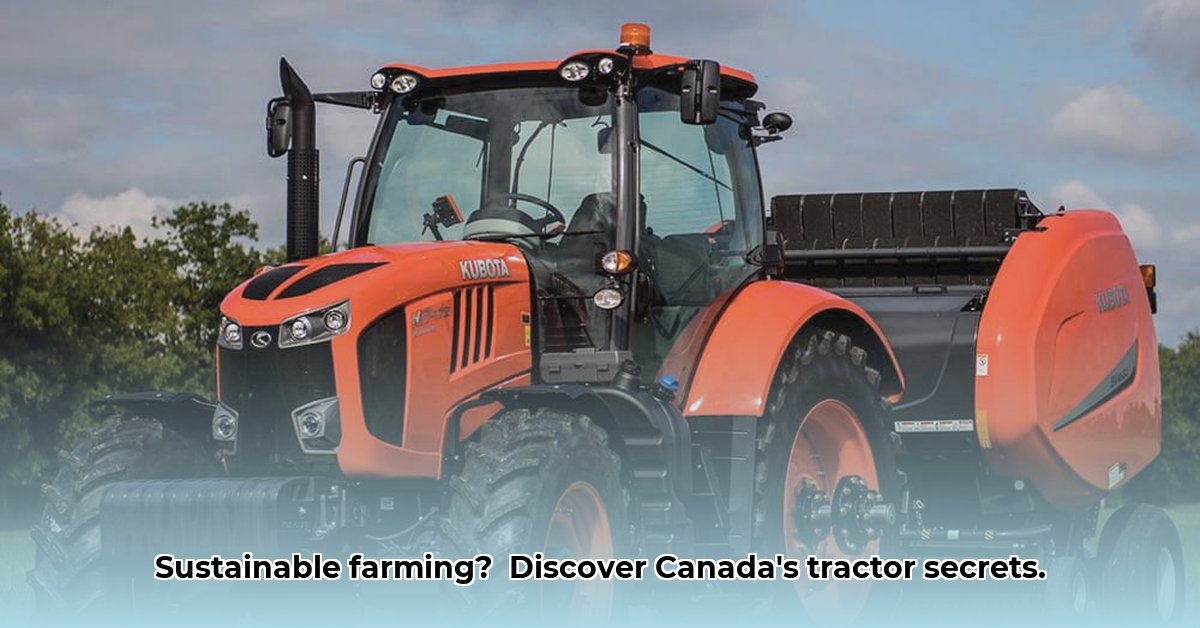
Finding the right tractor can significantly impact a Canadian farmer's success, especially for those prioritizing sustainable agriculture. This guide explores how tractors, particularly Kubota models, are helping Canadian farmers improve efficiency while minimizing their environmental footprint. For financing options, explore tractor financing options.
Kubota Tractors and Sustainable Farming in Canada
Canadian farmers face mounting pressure to adopt sustainable practices. Kubota tractors are increasingly popular, offering fuel efficiency and precision farming capabilities. Their lower fuel consumption translates to reduced operating costs and a smaller carbon footprint. Integrated features enable compatibility with precision agriculture technologies, optimizing resource use (fertilizer and water) and leading to higher crop yields and reduced environmental impact.
But the benefits extend beyond the tractors themselves. Kubota provides training and support to help farmers maximize their equipment's potential, facilitating a smoother transition to sustainable farming. This includes guidance on GPS-guided planting and spraying, optimizing efficiency and minimizing waste. Reduced soil compaction, a feature in some Kubota models, contributes to healthier soil, less erosion, and ultimately, more productive land. These long-term advantages significantly impact the creation of a greener agricultural sector.
Navigating the Canadian Tractor Market: Trends and Challenges
The Canadian tractor market is rapidly evolving, driven by growing awareness of sustainability. Farmers increasingly seek machinery aligned with their environmentally conscious practices. However, challenges remain:
Cost: The initial investment in advanced tractors can be substantial, particularly for smaller farms. Securing financing can be difficult, though government grants and loan programs offer potential solutions. Long-term costs, including fuel, maintenance, and repairs, require careful evaluation.
Training: Effectively using advanced tractor technology demands proper instruction and ongoing support. Farmers need proficiency with GPS, data analysis, and precision agriculture software. Fortunately, many manufacturers, including Kubota, provide comprehensive training and ongoing support.
Regional Variations: Canada’s diverse geography presents unique challenges. Climate variations, soil types, and typical crops influence tractor needs and preferences. A tractor ideal for the prairies may differ significantly from one suited for the eastern provinces.
Service and Repair: Reliable service and repair are crucial. Downtime is costly; readily available skilled technicians are vital.
Charting a Course to Success: Actionable Insights for All Stakeholders
Sustainable farming requires collaboration. Farmers, manufacturers, and government all play key roles.
For Canadian Farmers (Small and Large):
- Assess your needs: Consider farm size, crops, and budget to select a suitable tractor.
- Explore financing: Investigate bank loans, government grants, and leasing options.
- Invest in training: Utilize manufacturer programs or agricultural colleges to maximize your tractor's potential.
For Tractor Manufacturers (Kubota and Competitors):
- Innovate: Develop more environmentally friendly features, improving fuel efficiency, reducing emissions, and incorporating precision agriculture technologies.
- Build support: Provide comprehensive training, readily accessible technical support, and proactive customer service.
- Embrace transparency: Clearly communicate the environmental impact of their products.
For the Canadian Government:
- Fund training: Invest in extensive educational initiatives to equip farmers with the necessary skills.
- Offer incentives: Provide subsidies, tax breaks, and low-interest loans to encourage sustainable equipment adoption.
- Invest in infrastructure: Support the development of a strong service network for timely repair and maintenance.
Understanding the Risks in the Canadian Tractor Market
Even with the advantages of sustainable practices and advanced tractors, risks remain.
| Risk Factor | Likelihood | Impact | Mitigation Strategies |
|---|---|---|---|
| High Initial Cost | Moderately High | High | Government subsidies, financing options, leasing, used equipment purchases |
| Lack of Skilled Operators | Moderately High | Medium to High | Training programs, apprenticeships, manufacturer-farm collaborations |
| Technology Integration Issues | Medium | Medium | Robust technical support, user-friendly interfaces, ongoing technical assistance |
| Environmental Regulation Changes | Low | High (Potential) | Staying informed, adopting flexible operational strategies |
| Market Fluctuations | Medium | Medium | Diversification, strategic partnerships, long-term planning |
The future of Canadian farming depends on addressing these challenges collaboratively. By embracing sustainable practices and leveraging advanced tractor technology, Canadian farmers can ensure continued prosperity while protecting the environment. The transition to sustainable agriculture requires a multifaceted approach, with continuous innovation and collaboration among all stakeholders.